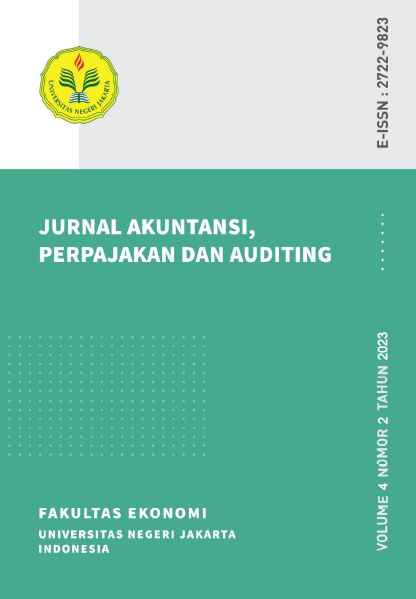Pengaruh Komitmen Profesional, Personal Cost, dan Gender Terhadap Intensi Whistleblowing
DOI:
https://doi.org/10.21009/japa.0402.10Keywords:
Professional Commitment, Personal Cost, Gender, Whistleblowing IntentionAbstract
This study aims to examine whether there is an influence of professional commitment, personal cost, and gender on whistlenlowing intention. The population in this study were auditors who worked at KAP in East Jakarta. The number of samples in this study were 41 respondents. The sampling technique uses purposive sampling method. The research method used is quantitative with primary data sources. The methode of data analysis uses multiple linear regression analysis with SPSS version 25. The results of this study prove empirically that personal cost have a positive significant effect on whistleblowing intention. Meanwhile professional commitment and gender have no effect on whistleblowing intention
References
ACFE. (2022). A report to the nations ®Foreword 2 Key Findings 4
Introduction 6 How Is Occupational Fraud Committed? 9 Detection 21 Victim Organizations 28.
Agung Pramugalih, A. (2020). The Effect of Whistle-blower Protectionand Personal Cost Towards Whistleblowing Intentions. In International Colloquiumon Forensics Accounting and Governance (ICFAG) (Vol.1, Issue1).
Agustiani, W. D., & Hasibuan, A. B. (2020). Fator-Faktor yang Mempengaruhi Intensi Whistleblowing: Studi Empiris pada Kantor Akuntan Publik di Jakarta. Jurnal Program Studi Akuntansi, 6 (2). https://doi.org/10.31289/jab.v6i2.3305
Ajzen, I. (2005). Attitudes, Personality and Behaviour (2nded.).
Ayem, S., & Rumdoni. (2021). Pengaruh Penalaran Moral, Retaliasi, Religiusutas, dan Gender Terhadap Niat Mahasiswa Melakukan Tindakan Whistleblowing. Akurat, Jurnal Ilmiah Akuntansi, 12 (2), 150–164.
Caplan, P. (1987). The Cultural Construction of Sexuality (1sted.).
Chiu, R. K. (2003). Ethical Judgment and Whistleblowing Intention: Examining the Moderating Role of Locus of Control. Journal of Business Ethics, 4 (3(1/2)), 65–74.
Cooper, D. R., & Schindler, P. S. (2014). Business Research Methods (12thed.). Mc Graw Hill International.
Dananjaya, D. G. Y., & Mawardi, R. (2018). Gender , Religiosity, Positive Mood and Whistleblowing Intention.Russian Journal of Agricultural and Socio-Economic Sciences, 73 (1), 117–123. https://doi.org/10.18551/rjoas.2018-01.15
Dungan, J., Waytz, A., & Young, L. (2015). The Psychology of Whistleblowing (Vol.6).
Ghozali, I. (2013). Aplikasi Analisis Multivariate dengan Program IBM SPSS21 (7thed.). Badan Penerbit Universitas Diponegoro.
Ghozali, I. (2016). Aplikasi Analisis Multivariate dengan Program (IBM SPSS)(8thed.). Badan Penerbit Universitas Diponegoro.
Ghozali, I. (2018). Aplikasi Analisis Multivariate dengan Program IBM SPSS (9thed.). Badan Penerbit Universitas Diponegoro.
Graham, J. W. (1986). Principled Organizational Dissent: A Theoretical Essay. Researchin Organizational Behavior, 8, 1–52.
Hadianti, A. N. (2010). Pendidikan Gender pada Anak Usia Dini. Edukasi Jurnal Penelitian & Artikel Pendidikan, 2(4).
Haliah, Nirwana, & Mangngalla, M. (2021). Pengaruh Pemberian Reward dan Komitmen Profesional Auditor Terhadap Niat Melakukan Whistleblowing. In Accounting Profession Journal (APAJI) (Vol.3, Issue1).
Indriani, M., Yulia, A., Nadirsyah, N., & Ariska, L. P. (2019). Whistleblowing Intention, Personal Cost, Organizational Commitment and Fraud Seriousness Level. Journal of Accounting and Investment, 20(2). https://doi.org/10.18196/jai.2002121
Luthfy Abdul Kodir, M. (2023). Pengaruh Intensitas Moral, Komitmen Profesional dan Locus of Control Mahasiswa Akuntansi Terhadap Tindakan Whistleblowing (Studi Empiris pada Mahasiswa Program Studi S1 Akuntansi Telkom (Vol. 10, Issue2).
Mela, N. F., Zarefar, N. A., & Andreas. (2016). The Relationship of Professional Commitment of Auditing Student and Anticipatory Socialization toward Whistleblowing Intention. Procedia-Social and Behavioral Sciences, 219, 507–512.
Mochtar, R. (2002). Sinopsis Kebidanan. Jakarta: EGC.
Near, J. P., & Miceli, M. P. (1985). Organizational Dissidence: The Case of Whistle - Blowing. Journal of Business Ethics, 4, 1–16.
Nesje, K. (2018). Personality and Professional Commitment of Students in Nursing, Social Work, and Teaching: A Comparative Survey. International Journal of Nursing Studies, 53, 173–181.
Nofrizaldi, D., & Helmayunita , N. (2023). Pengaruh Moral Reasoning, Retaliasi, Ethical Sensitivity dan Komitmen Profesional Terhadap Niat Melakukan Whistleblowing. Jurnal Eksplorasi Akuntansi, 5(2), 592–606. https://doi.org/10.24036/jea.v5i2.704
Nurdianawati, D., & Rachmawati, R. (2020). The Effect of Moral Intensity, Ethical Decision Making, Professional Commitment, and Anticipatory Socializationon Whistleblowing Intention.
Puni, A., & Hilton, S. K. (2020). Power Distance Culture and Whistleblowing Intentions: The Moderating Effect of Gender. International Journal of Ethics and Systems, 36 (2), 217–234. https://doi.org/10.1108/IJOES-10-2019-0163
Roscoe, J. T. (1975). Fundamental Research Statistics for the Behavioural Sciences (2nded.). Holt Rine hart & Winston.
Rothschild, J., & Miethe, T. D. (1999). Whistle-blower Disclosures and Management Retaliation: The Battle to Control Information about Organization Corruption. Work and Occupations, 26 (1), 107–128. https://doi.org/10.1177/0730888499026001006
Saputra, B., & Dwita, S. (2018). Pengaruh Retaliation dan Gender Terhadap Niat Melakukan Whistle Blowing Sany Dwita.
Setiawan, A. A., & Yanti, H. B. (2022). A Systematic Literature Review of Whistleblowing Intention: Variability, Research Trends, Methods, and Theories. Budapest International Research and Critics Institute-Journal, 5 (2), 17971–17988. https://doi.org/10.33258/birci.v5i2.5781
Tuan Mansor, T. M., Mohamad Ariff, A., & Hashim, H. A. (2020). Whistleblowing by Auditors: The Role of Professional Commitment and Independence Commitment. Managerial Auditing Journal, 35 (8), 1033–1055. https://doi.org/10.1108/MAJ-11-2019-2484
Utami, N. M. M. A., Irianto, G., & Prihatiningtias, Y. W. (2020). Analyzing The Effect of Financial Reward, Personal Cost and Reporting Channel on Whistleblowing Intention Sutilizing an Experimental Study. International Journal of Research in Business and Social Science (2147-4478), 9(2), 125–132. https://doi.org/10.20525/ijrbs.v9i2.614
Vermeir, I., & Kenhove, P. Van. (2008). Gender Differences in Double Standards. In Source: Journal of Business Ethics (Vol. 81, Issue 2).
Yulistia M, R., Minovia, A. F., Novianti, N., & Rasaki, K. (2022). Profesionalisme, Sensitivitas Etika, Personal Cost dan Intensi Melakukan Whistleblowing. Jurnal Akuntansi dan Ekonomika, 12(1), 1–11. https://doi.org/10.37859/jae.v12i1.3550






